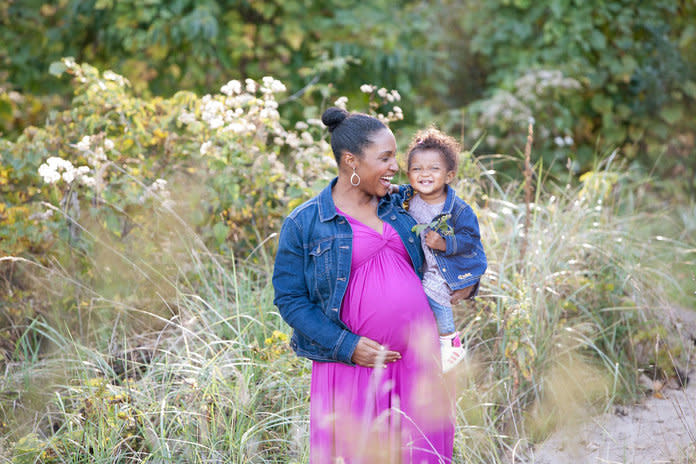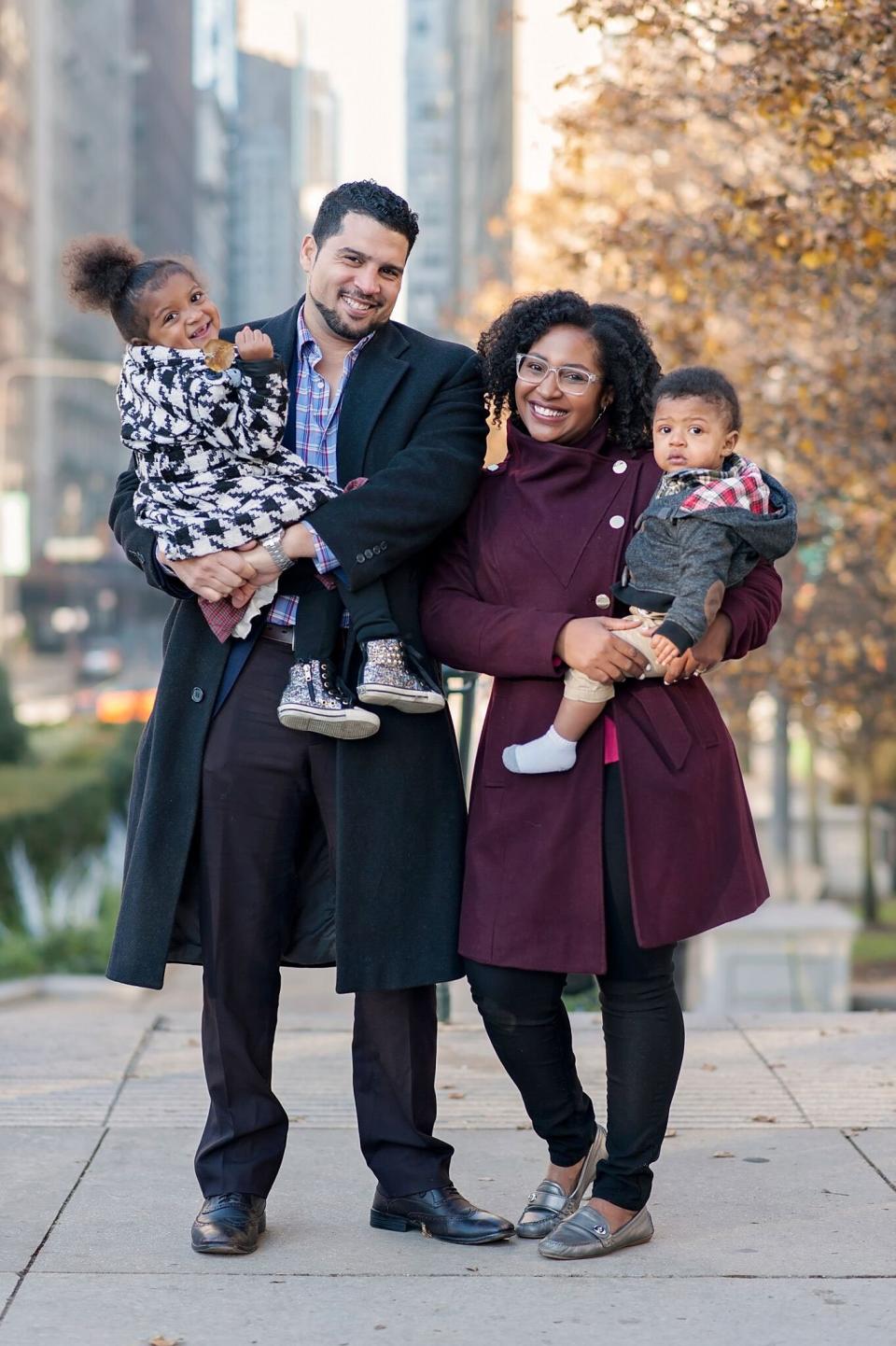I Lost Two Babies, And Almost My Own Life, to Preterm Labor
In 2012, I found out that I was pregnant with my first child, and it turned out it was twins. A boy and a girl. My husband and I were super excited. I was in my 30s and we thought this was it, we're going to complete our family.
Going into it, I was with a regular ob/gyn, and I told her that premature birth runs in my family. My mom lost two children before I was born to premature birth, and my sister's first son was born at 26 weeks. With twins, I knew premature birth was even more likely. My doctor kept reassuring me that everything was fine. Everything was normal. There was no reason to worry.
The weekend before I delivered my twins, I went in because I felt like I was having contractions, except my cervix wasn't open, so they sent me home. I let my doctor know and I asked her if I should come in before my next appointment. She said, "No. There's no reason. I'll see you on the 17th." I went into labor and the twins were born that week. I was only about 21 weeks pregnant.
My son was born first, we had named him Cole, and then a couple hours later, my daughter Ava was born. Neither one of them was developed enough to survive. It was traumatic. Heartbreaking. It wasn't just the loss of these two babies, it was the loss of this whole life that we had anticipated when I found out that we were expecting. We had been living in my one-bedroom condo before and had gone on a very earnest house search. We found a three-bedroom house, put the down payment down, had the home inspection and everything, and were just waiting for the closing date. But between the inspection and the closing, the twins were born and didn't survive. We finally had this house and it felt so empty. I was a mess.

RELATED: Losing a Loved One Changed the Way Actress Beanie Feldstein Sees the World
I was still physically recovering, too, because after that traumatic delivery, after holding those babies in my arms and watching them slip away, I had to go in for surgery because I was bleeding out. And then in the next days, my hemoglobin levels were critically low. The doctors still said, "Let's wait. Let's see if you feel better." And then finally, finally I got a blood transfusion. My twins died, and then I almost died, too.
I don't know whether this happened because I'm a woman of color or this is just what happens to moms. But I do know this is real. I understand what it's like to not be listened to.
I felt numb for a long time. I remember seeing acquaintances or friends or co-workers that would get pregnant and have a healthy pregnancy and go through it with full certainty and no fear. I have no idea what that's like. I went to see a grief counselor for a little bit, which helped a little. I took some of my maternity leave. And then, I started trying to figure out what had happened, trying to look for answers.
I blamed myself. Was there anything I could have done differently? I should have left that doctor. I should never have listened when she dismissed that this has happened to every woman in my family. I replay that a lot in my mind.
After the twins were born, people had wanted to send me flowers. Instead I asked them to make contributions to March of Dimes in their names. I didn't want any of that stuff in my house — I couldn't take it. But this gave all of it some meaning. And every time somebody would send a gift, March of Dimes would send a card saying, ”So-and-so made a gift in memory of Ava and Cole.” That was comforting. I felt like, okay, not only were they my babies, they were born, they had names, and now something good is happening in their names.
In 2012, a year after my twins were born, I got pregnant with my daughter Avery. This time, everything changed. The first thing I did was switch to a high-risk practice. I was seen almost weekly. My husband had to give me progesterone injections with this giant needle in my butt because that's supposed to keep you from going into pre-term labor. That was not fun at all. And around 20 weeks, around the time that I had gone into labor with my twins, I felt like I was having contractions again. It scared me so badly. I asked my job if I could work from home for the rest of my pregnancy and they approved it. So, I took all my meetings by phone, I had a laptop, I was in the house with our dog, and worked from home for 20 weeks. And it all paid off. She was born full term.

RELATED: My Neighbor Told Me to Stop Breastfeeding — Because Her Husband Was Watching
And then in 2016, I had my son Sullivan. I stayed with the high-risk practice for that pregnancy. The biggest thing for me was that they said, "If something feels wrong, tell us and we'll tell you to come in. Let us decide what's wrong." I was really thankful that I was with a high-risk practice, because without that, I'm sure I would have gone into labor and delivered my son too early.
When I talk to people about what happened to me, they always ask, “Weren't you scared to be pregnant again?" Of course, I was terrified. But in hindsight I feel like nothing out there should scare me after I went through all this and I survived. The ironic thing is whenever I take my kids out, without fail, someone asks me, "Oh, are they twins?" I feel like the universe is winking at me.
The entire experience showed me that so much is out of your control. I'm a big planner. I like to anticipate things, get in front of them, put together a plan, and go for it. But motherhood, childbirth, pregnancy, it's all luck of the draw. When you take that pregnancy test, it doesn't mean you're going to come home with a baby. When you see that baby on the monitor, it doesn't mean you're going to come home with a baby. It's all up to chance. You can't get a positive pregnancy test and say, "We're having a baby, and I want a girl." I think that was the biggest revelation for me and my husband. Because we used to be those people too.
This type of stuff happens more frequently than anybody realizes because people keep it quiet. There's still a lot of shame associated with it. I felt that shame. Everybody at work saw me very pregnant. Everybody knew I was having twins. So when I didn't have them, when I came home from the hospital empty-handed and had to go back to work without that joyful story or baby pictures, I felt like, my body couldn't do what it was supposed to do. I think the more that we talk about it, the more it becomes normal. And the more women won't feel that isolation or that shame around it.
Last month, I went to my state’s capitol to speak to the healthcare accessibility committee about a maternal heath bill. After I shared what happened to me, one of the people on the committee asked, “Don't the doctors share their notes to make sure that they know what happened and what went wrong?" I had to go back in and tell them that I'm the one who told my ob/gyn that I wouldn't be coming to my next appointment because my twins were born and died. Nobody told her. The system didn't convey, "Hey, your patient is no longer pregnant. The patient that you're caring for almost bled out. The patient that you're caring for went into preterm labor two days after you told her not to worry about the preterm labor contractions and issues she was having."
I'm glad that there's attention being paid to this now because there's no reason that moms should go in to deliver a baby and not come out alive. It's a crisis. I think Serena Williams talking about having a pulmonary embolism and Beyoncé speaking about having preeclampsia and an emergency C-section has helped to shine some light on this. I mean, if women of color with that much money, that much power, and that much influence are still ignored, you know, what chance does a regular woman of color have? Especially somebody that is in poverty or has less education or maybe doesn't have the ability to speak up for themselves.
RELATED: Beyoncé, Serena, and the Importance of Black Birth Stories
I am not an expert on the issue, but I think something as simple as giving some reason for healthcare professionals to be compassionate and listen could have a big positive impact. It may require rethinking the the way the system is set up. How are the incentives created? What are people benefiting from? Are they benefiting from getting the most, the highest number of people in and out of their office in a day? I know a lot of companies are about the bottom line, but when you meet a healthcare professional who cares about that patient and treats them like they would want someone to treat a member of their family — I think that's when things start to change.
—As told to Shalayne Pulia
For more information on how to get involved with March of Dimes, visit MachofDimes.org.


